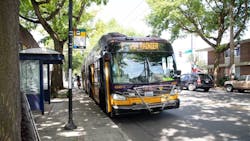King County Metro issues update on Safety, Security and Fare Enforcement Reform Initiative
King County Metro Transit’s Safety, Security and Fare Enforcement (SaFE) Reform Initiative was approved May 4 by the King County Council’s Law and Justice Committee.
The initiative now awaits final action by the full council.
The SaFE Reform Initiative is King County Metro’s plan to reimagine safety and security by reexamining and restructuring security and fare enforcement practices. The proposal stems from King County Executive Dow Constantine’s prioritization of anti-racism in the 2021-22 budget.
King County Metro says the initiative was developed during a period of dramatic change in Martin Luther King County and throughout the country. In June 2020, Executive Constantine declared racism to be a public health crisis and reaffirmed King County’s commitment to becoming anti-racist and pro-equity.
King County Metro notes the declaration came during the growing local, national and global awakening – led by the Black Lives Matter movement – to the experiences of police brutality and racist systems that disproportionately harm Black, Indigenous and people of color communities.
King County Metro has begun exploring new approaches to working with the communities it serves. The agency says it is focused on strengthening relationships to advance safety, equity and inclusion, and centering the voices of and input from Black, Indigenous and people of color (BIPOC) communities that enforcement systems have most negatively impacted.
King County Metro’s Fare Enforcement, Transit and Facility Security and Transit Police teams all contribute to its ability to address customers’ and employees’ safety and security needs. These safety and security functions provide King County Metro with the appropriate public safety resources to uphold the transit Code of Conduct on services. As established by King County Code, the Code of Conduct addresses “quality of life” and safety issues as needed on transit. The agency says reforming the role of transit safety is critical to King County Metro’s advancement to becoming an anti-racist mobility agency.
Developed through interaction with BIPOC communities, SaFE’s goal is to co-create public safety outcomes for the mobility system by developing and amending safety, security and fare enforcement policies and practices that continue to disproportionally impact communities already facing the challenges of systemic racism.
The internal and external engagement processes involved in developing SaFE will involve four steps:
- Define and co-create inclusive engagement through discussion and collaboration with employees and stakeholders (already completed).
- Establish transparency in how decisions will be made, set expectations on what this effort will address and reach agreement on this reform effort’s approach and scope.
- Determine which current policies and practices help and hurt the vision of what a safe and welcoming Metro looks like and how those adversely impacted experience the impacts of these policies and procedures.
- Empower and equip the community to prioritize all feasible recommendations by exploring previous phases’ content.
King County Metro says it understands that mobility is a human right and that, to achieve this, it needs the collaboration and participation of the community and employees. SaFE will help create a blueprint to make sure that all voices are heard as the agency aims to make its mobility system safer and more equitable.
